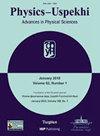互联网上的物理新闻(基于电子预印本)
IF 3.4
3区 物理与天体物理
Q1 PHYSICS, MULTIDISCIPLINARY
引用次数: 0
摘要
由来自意大利、美国、俄罗斯、德国、法国和波兰的近100名研究人员组成的研究小组,在Borexino实验(意大利拉奎拉附近的格兰萨索国家实验室)中,首次直接测量了铍核放射性衰变中产生的太阳中微子的能谱。氦原子核是在3He聚变中产生的;它们的衰变产生能量为0.862 MeV的单能电子中微子。在过去,这种中微子成分只能通过放射化学分离来整体检测。现有的探测器对中微子与水相互作用产生的Vavilov±Cherenkov辐射有响应,只能探测到能级在5 MeV以上的中微子。新的Borexino实验利用了一个液体有机闪烁体。通过中微子在电子上的弹性散射激发闪烁体分子,产生的信号足够强,可以用于亚mev中微子的实时光谱测量,从大约200 keV开始。C核b衰变的高背景噪声在更低的能量下占主导地位。实验设施包括结构元素和天然放射性水平非常低的材料,使用专门的技术制造。闪烁体被注入一个球形尼龙外壳,并被放置在一个被一层水包围的钢球内,而整个实验是在一个山隧道内进行的。在从所有已知过程中减去背景事件,并考虑到通过Mikheev±Smirnov±Wolfenstein机制产生的中微子振荡的影响后,发现中微子光谱与标准太阳模型中预测的铍太阳中微子具有很高的准确性。来源:http://arXiv.org/abs/0708.2251本文章由计算机程序翻译,如有差异,请以英文原文为准。
Physics news on the Internet (based on electronic preprints)
The energy spectrum of solar neutrinos produced in radioactive decays of Be nuclei was directly measured for the first time in the Borexino experiment (Gran Sasso National Laboratory near L'Aquila, Italy) by the team composed of nearly 100 researchers from Italy, the United States, Russia, Germany, France, and Poland. Be nuclei are created in the 3He He synthesis; their decay produces emission of monoenergetic electron neutrinos ne with an energy of 0.862 MeV. In the past, this neutrino component was detected only integrally by using radiochemical separation. The existing detectors that respond to the Vavilov ±Cherenkov radiation due to neutrino interaction with water can only reveal neutrinos with energy levels above 5 MeV. The new Borexino experiment utilizes a liquid organic scintillator. Excitation of scintillator molecules by elastic scattering of neutrinos on electrons results in a signal that is sufficiently strong for real-time spectral measurement of sub-MeV neutrinos, beginning with about 200 keV. High background noise of b-decays of C nuclei dominates at still lower energies. The experimental facility included structural elements and materials with a very low level of natural radioactivity, fabricated using specially dedicated technologies. The scintillator was poured into a spherical nylon shell and placed inside a steel sphere surrounded with a layer of water, while the experiment as a whole was run inside a mountain tunnel. After subtracting the background events from all known processes and taking into account the effect of neutrino oscillations via the Mikheev ± Smirnov ±Wolfenstein mechanism, the neutrino spectrum was found to be consistent, with high accuracy, with the beryllium solar neutrino predicted in the Standard Solar Models. Source: http://arXiv.org/abs/0708.2251
求助全文
通过发布文献求助,成功后即可免费获取论文全文。
去求助
来源期刊

Physics-Uspekhi
物理-物理:综合
CiteScore
4.70
自引率
7.40%
发文量
60
审稿时长
6-12 weeks
期刊介绍:
Physics-Uspekhi (Advances in Physical Sciences) is a translation of the authoritative Russian-language review journal in physics, Uspekhi Fizicheskikh Nauk, first published in 1918. The papers cover a wide spectrum of the world''s scientific research in physics and associated fields by authors from France, Germany, United Kingdom, Italy, Japan, Sweden, the USA and other countries which successfully complement contributions by authors from Russia and other states of the former Soviet Union.
Physics-Uspekhi (Advances in Physical Sciences) covers:
Reviews of Topical Problems
Physics of Our Day
Instruments and Methods of Investigation
Methodological Notes
From the History of Physics
Conferences and Symposia
Book Reviews
Selected Physics News from the Internet.
 求助内容:
求助内容: 应助结果提醒方式:
应助结果提醒方式:


